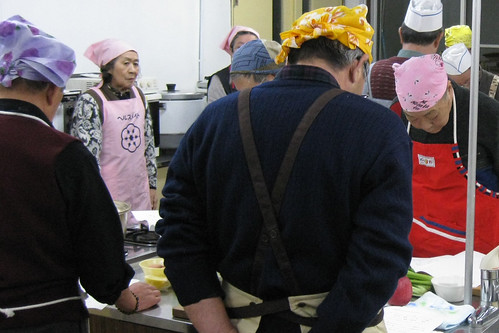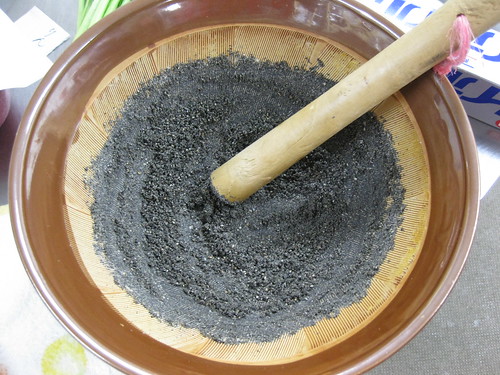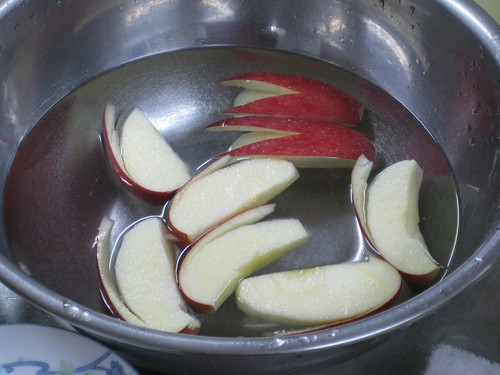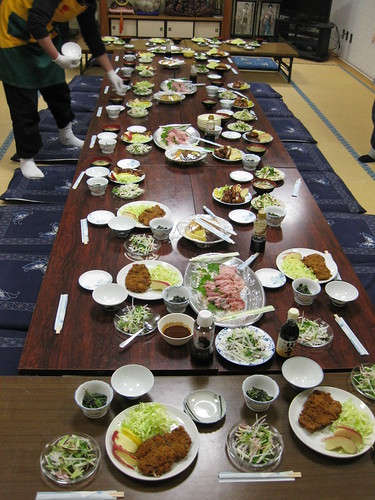
I started writing this immediately following Valentine's Day, but it got lost in all the excitement of the Busiest Month Ever. It was inspired by the Man Cooking lesson that me and a bunch of townies received from some culinarily experienced 'bachans. It was, in part, a Valentine's gift, I think. In Japan, Valentine's Day is a one-way thing: women use this day to honour their men by buying/making sweets for them.
And before any feminists cry foul, it should be noted that Valentines Day in Japan is followed by White Day a month later, and on White Day it is the men's turn to reward their ladies, and they are meant to pay back everything they received with interest. I don't know how exactly they calculate it, but the return gift from the man to his lady is meant to be of three times greater in value than what he received from her on Valentine's Day. Fortunately, as my lady hadn't yet accepted the position back on Valentine's Day, I'm free to reward her with three times bupkiss. However, I'm sure I'll find some way to honour her this weekend.
Four diminutive Japanese ladies in pink kerchiefs and aprons take the reins, sporting crests that are half hana half shuriken. In this men's cooking lesson, they are the senseis, and indeed it would seem that most of the men can't go too far without needing one of our matrons to bring us back in line.
Token foreigner boy is placed with the heads of board of education and vice principals, all the power they wield laid low before a tiny Japanese woman, as is often the way. Still, my 次長(Jicho) performs masterfully, seemingly better suited or more adapted to domestics. I spin it out into a harmonious, balanced relationship with his wife, while I picture the rest of the men calling for dinner from their armchairs.
I "soo-ka, soo-ka, soo-ka" at our printed recipes in jest, the hiragana I can read not forming up into much of anything. From between hieroglyphics of kanji, I piece together "go-ma--a-e" in readable kana, and demand to be put in charge of this one thing I've made before. Murakami-san boils the spinach for me, and Jicho fires the sesame, pouring the toasted grains into a vast mortar. I take to pestle, and the dark seeds are ground together into something that looks like smoke and tastes like sin. Taken straight, the paste is an anaphalactic shock to your tongue. I reflect that if the devil eats peanut butter, it's surely made from this. With sugar and with shoyu, the paste comes to look almost purple when mixed in with the limp spinach, giving the small dish a flavour that is at once arresting and alluring.
With the proper direction of diminutive Japanese ladies, we work all kinds of alchemy. Sauces from scratch, and rabbits from apples.
But then the women stand aside as it comes time for man's work: for taking something that was once living apart with a knife. Buri, whole fish, are produced from slick, slimy newsprint in styrofoam cartons. With blades that appear deceptively old and notched, these fishermen and farmers glide through sinew and bone, their wooden cutting blocks growing steadily more maroon. As they separate food from corpse, the buri lacks the near-display quality of sashimi. It is pink and grey and brown and marbled with fat. Were it to be served to you on a platter alongside other fish, it would surely be the last you chose. As we sit down to eat with our lady sensei, the buri hits my tongue and it's slippery and soft, and it tastes thick and wet.
As they separate food from corpse, the buri lacks the near-display quality of sashimi. It is pink and grey and brown and marbled with fat. Were it to be served to you on a platter alongside other fish, it would surely be the last you chose. As we sit down to eat with our lady sensei, the buri hits my tongue and it's slippery and soft, and it tastes thick and wet.





No comments:
Post a Comment